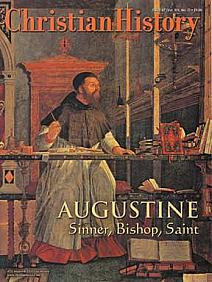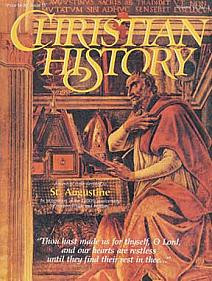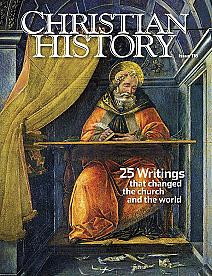Rome Fell but a Christian Classic Arose
ON THIS DAY, 24 August 410, Alaric and his Visigoth armies sacked Rome. The fall of the imperial city sent shock waves around the Mediterranean. It seemed the world could never be the same again. The Biblical scholar Jerome summed up the feelings of many when he wrote, “My voice sticks in my throat; and, as I dictate, sobs choke my utterance. The city which had taken the whole world was itself taken...”
Afterward, pagans blamed Christian virtues of humility and non-resistance for the debacle. They also said the fall of Rome proved Christianity false because Christians had died alongside pagans. Furthermore, the supposedly Christian Visigoths had raped Christian and pagan women indiscriminately. Why didn’t God protect the Christians? Another pagan argument was: According to Genesis, God would have spared Sodom if there had been just ten righteous souls in it. Yet Rome was a major church center with thousands of Christians—yet God allowed it to be ravaged.
Stung by such taunts and allegations, Augustine, bishop of Hippo in North Africa, responded by writing his masterpiece, The City of God and the City of Man. Like so much of Augustine’s work this book broke new ground. It was the world’s first teleological history (a history showing that events have purpose and final destiny).
Augustine retorted that the barbarian invaders had spared most of Rome’s churches. Even pagans had found refuge in the Christian places of worship. God had indeed protected people. At any rate, Christians had always suffered and would continue to suffer in this world, he said. Christians had no special immunity from pain or sorrow.
To the charge that Christian non-retaliation was to blame for Rome’s fall, Augustine retorted that the best pagans had held virtue in high esteem. The real cause of imperial weakness, he said, was pagan immorality. “Why were the gods so negligent as to allow the morals of their worshippers to sink to so low a depth?... why did not those gods ... lay down moral precepts that would help their devotees to lead a decent life?”
As he saw it, the sack of Rome was but an episode in a great war between God’s kingdom and humanity’s—the rival cities of God and man. It was a war which would last until the end of the world. God’s city consisted of those who love him and his things. That such a city was not as clearly defined now as it should be, he wrote, was because many who claim to be Christians are not. Humanity’s city was the realm of those who hate God and love their appetites.
It took Augustine fourteen years to finish his universal history. But after The City of God, history would never be the same again.
—Dan Graves
----- ----- -----
Christian History Institute has many resources about Augustine. You could begin with Augustine: A Voice for All Generations which travels to Fourth Century Rome and Milan to discover how and why Augustine became a "Voice for all generations." Watch at RedeemTV.
Purchase A Voice at Vision Video. Other great resources from Vision Video are Torchlighters: The Augustine Story (stream The Augustine Story on RedeemTV), Pioneers Of The Spirit: Augustine Of Hippo, and A Third Testament (stream A Third Testament on RedeemTV)
Christian History #67 Augustine: Sinner, Bishop, Saint
Christian History #15, St. Augustine of Hippo
“Take and read” in Christian History #116 - 25 Writings that Changed the Church and the World










